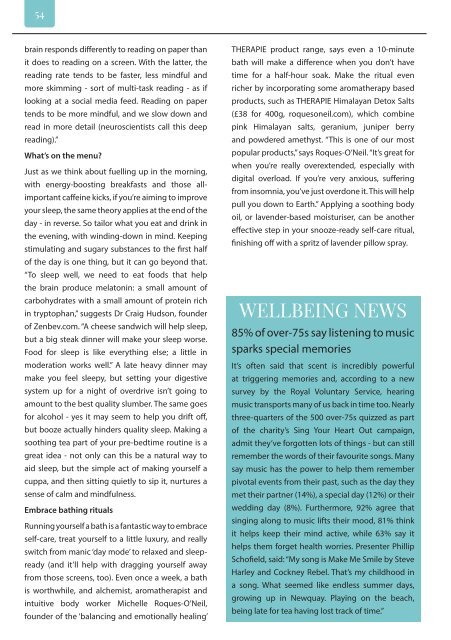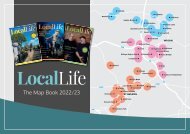Local Life - Wigan - January 2018
Wigan's FREE local lifestyle magazine.
Wigan's FREE local lifestyle magazine.
- TAGS
- wigan
- orrell
- billinge
- winstanley
Create successful ePaper yourself
Turn your PDF publications into a flip-book with our unique Google optimized e-Paper software.
54<br />
brain responds differently to reading on paper than<br />
it does to reading on a screen. With the latter, the<br />
reading rate tends to be faster, less mindful and<br />
more skimming - sort of multi-task reading - as if<br />
looking at a social media feed. Reading on paper<br />
tends to be more mindful, and we slow down and<br />
read in more detail (neuroscientists call this deep<br />
reading).”<br />
What’s on the menu?<br />
Just as we think about fuelling up in the morning,<br />
with energy-boosting breakfasts and those allimportant<br />
caffeine kicks, if you’re aiming to improve<br />
your sleep, the same theory applies at the end of the<br />
day - in reverse. So tailor what you eat and drink in<br />
the evening, with winding-down in mind. Keeping<br />
stimulating and sugary substances to the first half<br />
of the day is one thing, but it can go beyond that.<br />
“To sleep well, we need to eat foods that help<br />
the brain produce melatonin: a small amount of<br />
carbohydrates with a small amount of protein rich<br />
in tryptophan,” suggests Dr Craig Hudson, founder<br />
of Zenbev.com. “A cheese sandwich will help sleep,<br />
but a big steak dinner will make your sleep worse.<br />
Food for sleep is like everything else; a little in<br />
moderation works well.” A late heavy dinner may<br />
make you feel sleepy, but setting your digestive<br />
system up for a night of overdrive isn’t going to<br />
amount to the best quality slumber. The same goes<br />
for alcohol - yes it may seem to help you drift off,<br />
but booze actually hinders quality sleep. Making a<br />
soothing tea part of your pre-bedtime routine is a<br />
great idea - not only can this be a natural way to<br />
aid sleep, but the simple act of making yourself a<br />
cuppa, and then sitting quietly to sip it, nurtures a<br />
sense of calm and mindfulness.<br />
Embrace bathing rituals<br />
Running yourself a bath is a fantastic way to embrace<br />
self-care, treat yourself to a little luxury, and really<br />
switch from manic ‘day mode’ to relaxed and sleepready<br />
(and it’ll help with dragging yourself away<br />
from those screens, too). Even once a week, a bath<br />
is worthwhile, and alchemist, aromatherapist and<br />
intuitive body worker Michelle Roques-O’Neil,<br />
founder of the ‘balancing and emotionally healing’<br />
THERAPIE product range, says even a 10-minute<br />
bath will make a difference when you don’t have<br />
time for a half-hour soak. Make the ritual even<br />
richer by incorporating some aromatherapy based<br />
products, such as THERAPIE Himalayan Detox Salts<br />
(£38 for 400g, roquesoneil.com), which combine<br />
pink Himalayan salts, geranium, juniper berry<br />
and powdered amethyst. “This is one of our most<br />
popular products,” says Roques-O’Neil. “It’s great for<br />
when you’re really overextended, especially with<br />
digital overload. If you’re very anxious, suffering<br />
from insomnia, you’ve just overdone it. This will help<br />
pull you down to Earth.” Applying a soothing body<br />
oil, or lavender-based moisturiser, can be another<br />
effective step in your snooze-ready self-care ritual,<br />
finishing off with a spritz of lavender pillow spray.<br />
WELLBEING NEWS<br />
85% of over-75s say listening to music<br />
sparks special memories<br />
It’s often said that scent is incredibly powerful<br />
at triggering memories and, according to a new<br />
survey by the Royal Voluntary Service, hearing<br />
music transports many of us back in time too. Nearly<br />
three-quarters of the 500 over-75s quizzed as part<br />
of the charity’s Sing Your Heart Out campaign,<br />
admit they’ve forgotten lots of things - but can still<br />
remember the words of their favourite songs. Many<br />
say music has the power to help them remember<br />
pivotal events from their past, such as the day they<br />
met their partner (14%), a special day (12%) or their<br />
wedding day (8%). Furthermore, 92% agree that<br />
singing along to music lifts their mood, 81% think<br />
it helps keep their mind active, while 63% say it<br />
helps them forget health worries. Presenter Phillip<br />
Schofield, said: “My song is Make Me Smile by Steve<br />
Harley and Cockney Rebel. That’s my childhood in<br />
a song. What seemed like endless summer days,<br />
growing up in Newquay. Playing on the beach,<br />
being late for tea having lost track of time.”


















